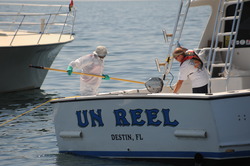BP vows to do a better job of hiring commercial fishermen for oil cleanup
 During our recent reporting trip to the Gulf Coast, we met with commercial fishermen who complained that the oil cleanup jobs they so desperately needed were going instead to recreational fishermen.
During our recent reporting trip to the Gulf Coast, we met with commercial fishermen who complained that the oil cleanup jobs they so desperately needed were going instead to recreational fishermen.A BP spokesperson acknowledged the problem with its Vessels of Opportunity program -- and said the company would be making changes.
Yesterday Doug Suttles, chief operating officer of BP Exploration and Production, met with program participants to discuss those changes.
"The enhancements announced today will further strengthen the Vessels of Opportunity program, getting the right vessels into the fight in the fairest way possible," Suttles said. "We've listened carefully to those working on this important effort, and we appreciate the changes they've recommended."
Among the changes is a greater focus on local, in-state vessel sources. BP also said it would concentrate more on using commercial and charter fishing vessels, with recreational craft called up only when no suitable local commercial vessels are available.
The VoO program pays $1,200 to $3,000 per boat daily, depending on the vessel's size. Deck hands earn $200 for an eight-hour shift and $300 for 12 hours. The program has activated more than 3,000 vessels for duty in Alabama, Florida, Louisiana and Mississippi.
More than 81,000 square miles of the Gulf of Mexico have been officially closed to fishing because of the oil spill, while the National Oceanic and Atmospheric Administration's Fisheries Service advises against fishing in areas where oil or an oily sheen are present -- even if those areas are not officially closed.
(Photo of a Vessel of Opportunity collecting oil off the Florida coast by Petty Officer 3rd Class Colin White.)
Tags
Sue Sturgis
Sue is the former editorial director of Facing South and the Institute for Southern Studies.
